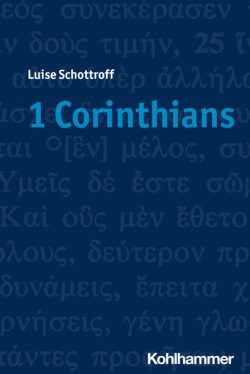Читать книгу 1 Corinthians - Luise Schottroff - Страница 37
На сайте Литреса книга снята с продажи.
3:1–4
Оглавление1 And yet, sisters and brothers, I could not address you as people who are filled with the Spirit. You were children of your time, infants in Christ. 2 I have given you mother’s milk to drink, not solid food. You were not that far along, and even now that is still the case. 3. For your life is still entrapped in its limitations. If there are still controversies and strife in your midst, are you not then children of your time, who are living in a way that is common in society? 4 If some say, »I belong to the Paul group,« others, »I belong to the Apollos group,« are you not, then, behaving like all the others?
Essentially, they should have been able to live as people of the Spirit: 3:1 connects with 2:15, but, in fact, how they live contradicts their relationship with God. They live out their daily lives as though they had not experienced messianic liberation: they accommodate themselves to the structures of this world (sarkinoi; cf. 3:3). In 3:1–2 Paul employs this image: Like a nursing mother or a wet nurse, he lets the congregation drink milk, since they were like breastfeeding infants, unable to handle solid food; indeed, that’s the situation up to that very moment. That he gives steps in childrearing that start with milk and then go to solid food, has extra-biblical parallels.160 What is unusual with respect to this background is that Paul applies this image to himself161 and compares himself to a nursing mother or a wet nurse. In the few passages in which Paul places himself in a parental relationship with the congregation, when he calls himself father, he also brings the mother into play (here, 4:14–16).162 In a society in which masculinity serves the ideology of the empire and is to be publicly displayed as a representation of control, his portrayal of himself is clearly non-masculine (cf. his relationship to public rhetoric in 2:1). Thereby his work as the congregation’s tutor is consciously kept clear of claims of dominance.163 Beyond all that, Paul makes himself, as a non-virile man, vulnerable and ridiculous: he carries out a conscious »queering,«164 that is, he does not observe the ordering of sexual and authority identities demanded by society. Milk and solid food relate to the different levels of clarity Paul provides in his criticism of power struggles, not to two versions of the gospel, as is frequently discussed.
3:3–4 should not have been understood as a polemic but as a critique that points to the kind of structures revealed in conflicts and strife: the clueless accommodation to societal power struggles aimed at oppressing other people. Kata anthrōpon (cf. the use of the word anthrōpos in 1:25; 2:5 and 3:4), »the way people usually operate,« is not devaluing human life as such. Rather it deals with societal structures that destroy rather than edify: being human apart from God. Persuasiveness gets its illuminating argument from the fact that it can presuppose that is precisely what the hearers do not want. They want to live in accord with God’s will.
3:4 refers to 1:11–13. Here he is clearly criticizing them; that is the solid food (3:2) that to this point Paul has served up only in smaller portions.
